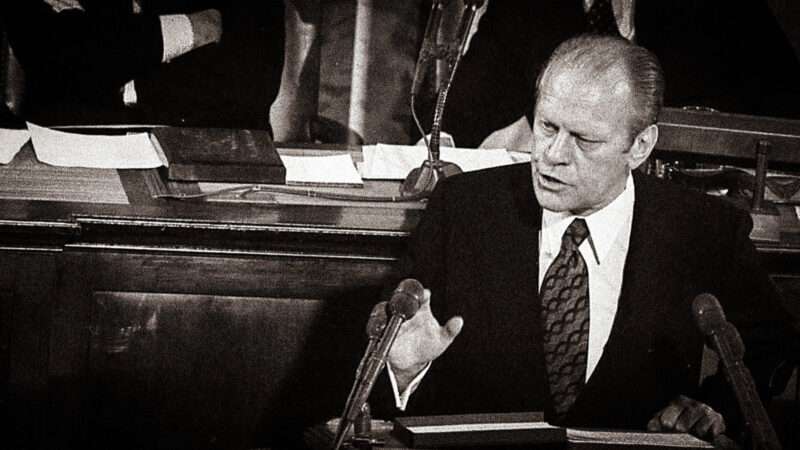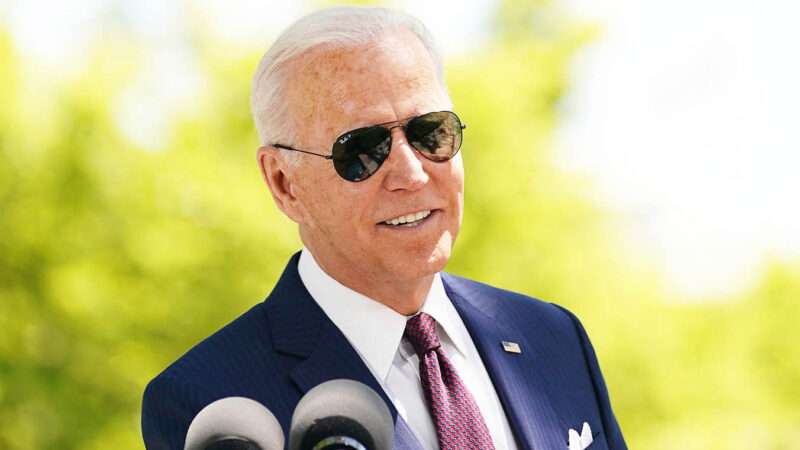‘Tis the season for pompous presidential speeches to Congress. Most years we call these prime-time pitches the State of the Union address, though beginning in earnest with Ronald Reagan in 1981, first-term presidents have stepped in where lame-duck executives once stood and delivered something of a less official yet still aspirational pep talk to a Joint Session of Congress. Such we will experience tonight.
In most years this annual exercise in presidential self-importance—which in less imperious times (1801–1912) was delivered in letter form—is an occasion to study bad speech writing, insincere promise making, and palpable crisis-envy, as the man in the Oval Office wishes out loud that the nation was panicked enough to confuse his domestic agenda with yet another “moonshot.”
But sometimes, as in 2021, the national trauma is real. First-term presidents in the wake of widespread calamity tend to go very big in their early-season congressional asks, and they tend to get much of what they want, changing the trajectory of American history.
Lyndon Johnson, in his celebrated 1964 SOTU after the assassination of John F. Kennedy, declared a “war on poverty,” and helped push through the Civil Rights Act. Gerald Ford, post-Watergate and amid the oil shocks of 1975, laid the groundwork for Washington’s star-crossed 1970s interventions into the energy sector. Reagan in 1981 outlined an entire course correction on economic policy, much of which would be enacted during his first term despite a Democrat-controlled House of Representatives. And Barack Obama in 2009, with now–President Joe Biden looking on behind him, bragged about his just-passed American Recovery and Reinvestment Act and rhetorically paved the way for what would eventually be known as Obamacare.
So more than usual, Americans should take seriously the words passing the president’s lips tonight, as they have a much higher chance of being translated into policy. Biden in his first 99 days has already sent a staggering amount of money out the door, with hopes of doubling and tripling down. The sheer size of spending, deficits, and debts are placing the country in unchartered territory, but the president also has terraforming ambitions on everything from infrastructure to labor relations to racial “equity.”
We can learn a lot, or at least laugh a little, when looking back through history at comparable presidential speeches, and the policies they helped unleash. So in chronological order, here are bite-sized analyses of the four addresses delivered under circumstances that most resemble Biden’s.
—
LYNDON JOHNSON, 1964
Days in office: 50
Recent national trauma: The November 1963 assassination of John F. Kennedy, plus the continuous civil rights protests, clashes, and murders during the previous calendar year.
Elegy: “In these last seven sorrowful weeks, we have learned anew that nothing is so enduring as faith, and nothing is so degrading as hate. John Kennedy was a victim of hate, but he was also a great builder of faith.”
Moonshot: There were two. 1) “This administration today, here and now, declares unconditional war on poverty in America….Our aim is not only to relieve the symptom of poverty, but to cure it and, above all, to prevent it.” 2) “As far as the writ of federal law will run, we must abolish not some, but all racial discrimination.”
Congressional control: Democrats 66-34 in the Senate, 253-177 in the House.
Scorecard: Governmental discrimination at the federal, state, and local level was indeed curtailed by the Civil Rights Act, though its Title VII became the backdoor through which positive discrimination was driven through. Poverty, on the other hand, was not at all cured.
Them old mountains sure look like molehills!: The budget, LBJ promised, “will cut our deficit in half—from $10 billion to $4,900 million.” Granted, $10 billion in 1964 was worth around $85 billion in 2020 dollars. But $85 billion in the first six months of Fiscal 2021 amounted to…just around nine days’ worth of deficit.
Libertarian policy porn: “[My agenda] can be done without any increase in spending. In fact, under the budget that I shall shortly submit, it can be done with an actual reduction in federal expenditures and federal employment…. It will be, in proportion to our national output, the smallest budget since 1951.” Federal spending during Johnson’s presidency, needless to say, was not reduced.
Bitter irony: “For our ultimate goal is a world without war.” Seven months later came the Gulf of Tonkin Resolution.
Did NOT see that coming: “This administration must and will preserve the present gold value of the dollar.”
—
GERALD FORD, 1975
Days in office: 153
Recent national trauma: Watergate (which did not get mentioned), plus ongoing oil shocks.
Elegy: “I must say to you that the state of the union is not good.”
Moonshot: “I am proposing a program which will begin to restore our country’s surplus capacity in total energy. In this way, we will be able to assure ourselves reliable and adequate energy and help foster a new world energy stability for other major consuming nations….We must end vulnerability to economic disruption by foreign suppliers by 1985.”
Congressional control: Democrats 60-37 in the Senate, 291-144 in the House.
Scorecard: The United States did not achieve energy independence by 1985, and the late 1970s were filled with gas lines and more oil shocks.
Them old mountains sure look like molehills!: “This year’s federal deficit will be about $30 billion; next year’s probably $45 billion. The national debt will rise to over $500 billion.” With inflation, those number translate to $145 billion, $220 billion, and $2.45 trillion, respectively. Meanwhile, the federal deficit alone in 2021 will likely be higher, adjusted for inflation, than the entire accumulated national debt as of 1975.
Libertarian policy porn: “Only a reduction in the growth of spending can keep federal borrowing down and reduce the damage to the private sector from high interest rates. Only a reduction in spending can make it possible for the Federal Reserve System to avoid an inflationary growth in the money supply and thus restore balance to our economy. A major reduction in the growth of federal spending can help dispel the uncertainty that so many feel about our economy and put us on the way to curing our economic ills.”
Bitter irony: “If our foreign policy is to be successful, we cannot rigidly restrict in legislation the ability of the president to act. The conduct of negotiations is ill-suited to such limitations. Legislative restrictions, intended for the best motives and purposes, can have the opposite result.” The deliberative 21st century rollback of presidential foreign policy restrictions by Ford administration veteran Dick Cheney helped midwife one of the single most disastrous decisions in the history of American foreign policy.
Did NOT see that coming: “Now, I want to speak very bluntly. I’ve got bad news, and I don’t expect much, if any, applause….My message today is not intended to address all of the complex needs of America.” Can we make this the opening paragraph of all SOTUs going forward?
—
RONALD REAGAN, 1981
Days in office: 30
Recent national trauma: The recently resolved Iranian hostage crisis, but mostly: “All of us are aware of the punishing inflation which has for the first time in 60 years held to double-digit figures for 2 years in a row. Interest rates have reached absurd levels of more than 20 percent and over 15 percent for those who would borrow to buy a home. All across this land one can see newly built homes standing vacant, unsold because of mortgage interest rates. Almost 8 million Americans are out of work.”
Elegy: “Can we, who man the ship of state, deny it is somewhat out of control?”
Moonshot: “I am proposing a comprehensive four-point program…This plan is aimed at reducing the growth in government spending and taxing, reforming and eliminating regulations which are unnecessary and unproductive or counterproductive, and encouraging a consistent monetary policy aimed at maintaining the value of the currency.”
Congressional control: Republicans 53-46 in the Senate, Democrats 243-191 in the House.
Scorecard: Well, Reagan’s first-term economic reforms are the subject of debate to this day. Taxes were cut, spending was not, the deregulation that was launched under Jimmy Carter continued for a while then petered out. But also, inflation was tamed, the economy boomed, and the mood of the nation was noticeably changed.
Them old mountains sure look like molehills!: “Our national debt is approaching $1 trillion. A few weeks ago I called such a figure—a trillion dollars—incomprehensible, and I’ve been trying ever since to think of a way to illustrate how big a trillion really is. And the best I could come up with is that if you had a stack of thousand-dollar bills in your hand only 4 inches high, you’d be a millionaire. A trillion dollars would be a stack of thousand-dollar bills 67 miles high.” Since the national debt now stands at upwards of $22 trillion, that means the subsequent stack of Grover Clevelands, placed on its side, would stretch from Boston to Miami.
Libertarian policy porn: Like many political speeches of the time (including by Democrats), there was a lot to choose from: “The taxing power of government must be used to provide revenues for legitimate government purposes. It must not be used to regulate the economy or bring about social change. We’ve tried that, and surely we must be able to see it doesn’t work. Spending by government must be limited to those functions which are the proper province of government. We can no longer afford things simply because we think of them.”
Bitter irony: “We’re asking that another major industry—business subsidy I should say, the Export-Import Bank loan authority, be reduced by one-third in 1982. We’re doing this because the primary beneficiaries of taxpayer funds in this case are the exporting companies themselves—most of them profitable corporations.” This is ironic mostly because we’ve always known this agency is corporatist garbage, yet never kill it.
Did NOT see that coming: The word communism—Reagan’s longtime bête noire, was not uttered once. The Soviet Union merited two meager paragraphs.
—
BARACK OBAMA 2009
Days in office: 36
Recent national trauma: The financial crisis of 2008
Elegy: “Now, if we’re honest with ourselves, we’ll admit that for too long, we have not always met these responsibilities as a government or as a people….The fact is, our economy did not fall into decline overnight, nor did all of our problems begin when the housing market collapsed or the stock market sank.”
Moonshot: “We must have quality, affordable health care for every American. It’s a commitment that’s paid for in part by efficiencies in our system that are long overdue. And it’s a step we must take if we hope to bring down our deficit in the years to come….Nearly a century after Teddy Roosevelt first called for reform, the cost of our health care has weighed down our economy and our conscience long enough. So let there be no doubt: Health care reform cannot wait, it must not wait, and it will not wait another year.”
Congressional control: Democrats 56-41 in the Senate, 254-178 in the House.
Scorecard: The gap between the Affordable Care Act’s promises and results was wide enough that every Democrat running for president in 2020 ran on drastically overhauling it.
Them old mountains sure look like molehills!: “Yesterday I held a fiscal summit where I pledged to cut the deficit in half by the end of my first term in office. My administration has also begun to go line by line through the federal budget in order to eliminate wasteful and ineffective programs. As you can imagine, this is a process that will take some time. But we have already identified $2 trillion in savings over the next decade.” Even adjusted for inflation, those annualized savings of $250 billion (which may have been identified, but were never realized), would at this point cut the 2021 deficit by less than one-tenth.
Libertarian policy porn: “We will end education programs that don’t work and end direct payments to large agribusiness that don’t need them. We’ll eliminate the no-bid contracts that have wasted billions in Iraq and reform our defense budget so that we’re not paying for Cold War–era weapons systems we don’t use. We will root out the waste and fraud and abuse in our Medicare program that doesn’t make our seniors any healthier.” I’m sure it was pretty to think so!
Bitter irony: “To overcome extremism, we must also be vigilant in upholding the values our troops defend, because there is no force in the world more powerful than the example of America. And that is why I have ordered the closing of the detention center at Guantanamo Bay.”
Did NOT see that coming: “And to respond to an economic crisis that is global in scope, we are working with the nations of the G-20 to restore confidence in our financial system, avoid the possibility of escalating protectionism, and spur demand for American goods in markets across the globe.” Remember when U.S. presidents warned against trade protectionism?
—
Biden’s speech tonight is almost certainly not to register much of a blip in the history of political rhetoric. But it could mark a further milestone in the history of ever-expanding federal government. Buyer beware.
from Latest – Reason.com https://ift.tt/3gM5v4k
via IFTTT



